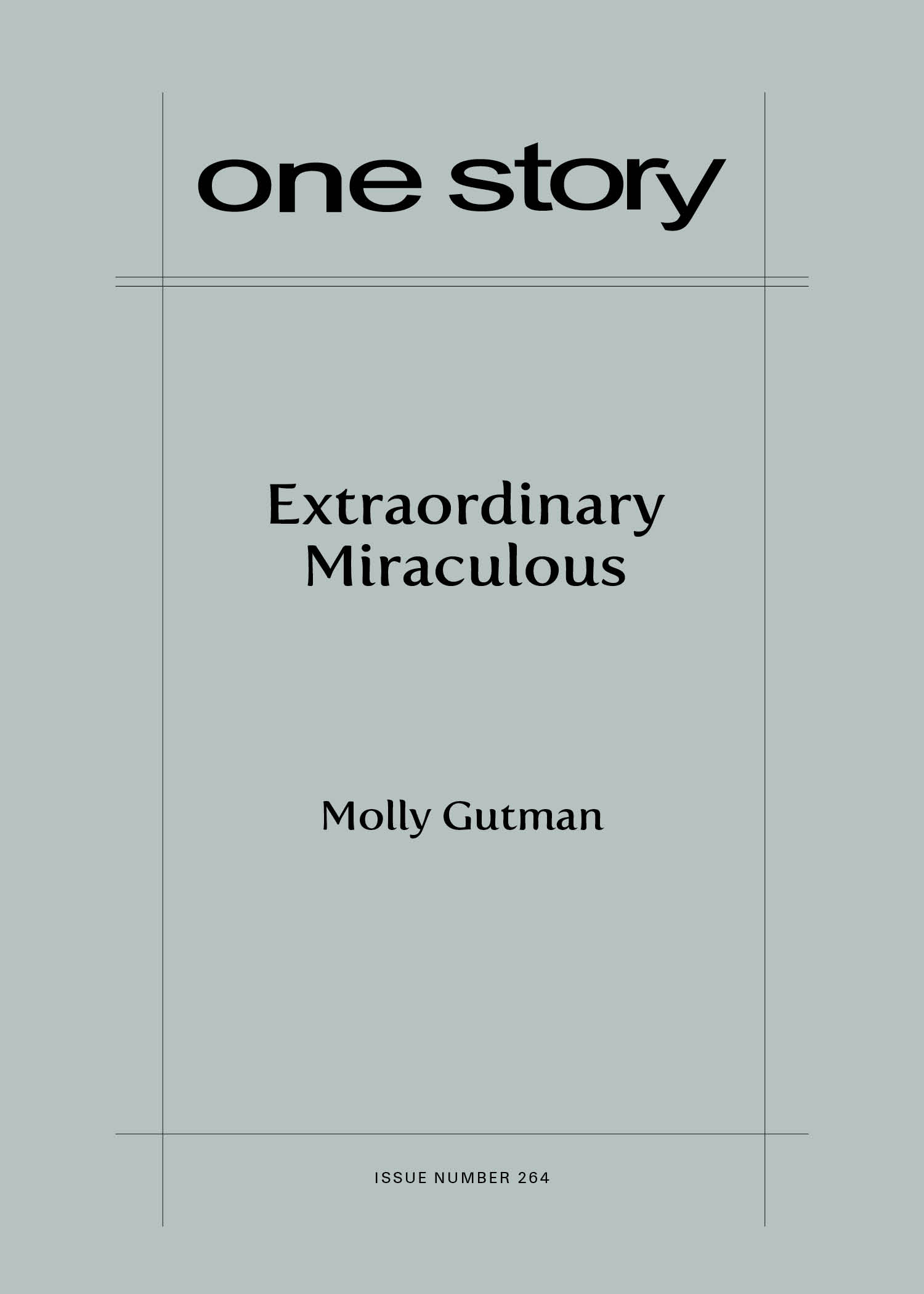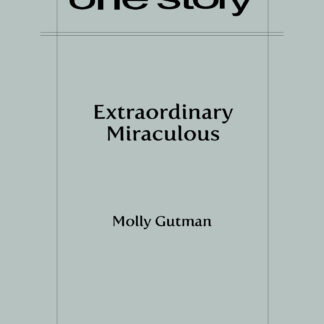
Extraordinary Miraculous
$2.50
75 in stock
Excerpt
Let’s be fair here, and also direct to the heart of things: a baby is born to the family Hominina—that is, the family is not chimpanzee, though its members share certain features—and this baby, most strangely, does not look at all like its parents. The baby is not, or is not quite, Hominina. But it is not yet Homo, either.
Hominina, Homo, these are categories about which concerned parties do not care. The terms laid here are of little consequence to those involved. The episodes have already passed.
The baby comes forth where the roots of several mountains—the giant ones, with recognizable names—greet one another by shaking the earth. But the plates have mostly settled by now; they are not so volcanic as they had been, earlier in the Pleistocene. And, anyway, the point here is to offer a picture of the scale of landscape into which the baby is born, and also, one hopes, a scale of the import of what’s being born in the first place. Right away the family senses that something’s new and wrong. They sense that they’re bearing witness. It would not be hyperbolic to say to a miracle.
Molly Gutman
Molly Gutman’s fiction has appeared in Granta, Alaska Quarterly Review, Lightspeed Magazine, and elsewhere. Originally from Arkansas, she earned her MFA from the University of Nevada, Reno. Molly is a PhD student in writing at the University of Wisconsin-Milwaukee, where she helps to edit Cream City Review. She’s at work on a story collection, a novel for adults, and a novel for children.
Patrick Ryan on “Extraordinary Miraculous”
One of my favorite characters in our new issue, Molly Gutman’s “Extraordinary Miraculous,” is named Um. Another is named Hoo, and another, Eeag! (exclamation point included). But my favorite character has no name at all, no qualifying features, no import—and that character is the narrator.
At once sounding like a formal voiceover in a nature documentary and a concerned, helpless spectator, this narrator invites you to swoop in and observe a family that feels familiar yet is unlike any you’ve encountered before.
It can’t have been easy, living in the Pleistocene some million-plus years ago. The raising of children went hand-in-hand with the battle for survival. The ones who ate were the ones who didn’t get eaten. The ones who rested overnight and managed to survive were the ones who adapted and got lucky.
I’ve never read anything like “Extraordinary Miraculous.” In fact, when I first finished it, I sat back, pages in hand, and tried to wrap my head around how Molly Gutman had accomplished what she had; then, without getting up from my chair, I started back at the first sentence and read the story again. I’m still not sure how she did it. We hope you enjoy this odd and compelling short story as much as we did. If you get the urge to sleep in trees while reading it, keep your eyes down, not up. The stars are beautiful, but what lurks below is hungry.
Q&A by Patrick Ryan
- PR: Where did the idea for this story come from?
- MG: I used to live thirty hours from most of my family, and I loved that drive—my husband and I made it probably a dozen times. It took us through Nevada, Arizona, and New Mexico, and the colors of the landscape there are these shocking, gorgeous pastels. I started wondering what the world looked like before we laid highways all over it. Then I dug earlier and earlier: I wanted accounts of the very beginning. What could I do with a story that was all about the first plants, the earliest layers of rock, the primordial colors? Originally, I wanted a story that had no people in it. I held onto that idea for a couple of years before I started drafting, at which point I abandoned the “no humans in the story” idea. Well, ha, sort of.
- PR: What was the most challenging aspect of writing this story?
- MG: I’ll be a little vague so as not to spoil the end—there is, let’s say, a turn in the last paragraph. I outlined seven or eight different ways the ending could go, all of them too dark for the story I was trying to write, too far afield of its trajectory and concerns and ethics. Spent several hours drafting and deleting alternate endings.
- PR: Were there any surprises during the writing? Another way I sometimes ask this question is, how different is the finished story from the one you originally envisioned?
- MG: The story kernel had no trace of human life, no humanoid characters at all. So, in that way, this version is quite different. I would need to be a better writer, or maybe I would need a different story, to get that done and done well. The voice was also a big surprise: I knew the story needed some distance, but that narrator came out of nowhere. I can’t write very far into a story if I don’t feel like the voice is right, so I feel lucky that I landed on this one quickly.
- PR: Speaking of that, one of the many things I’m fascinated with in this story is the narrator. The narrator is a reporter, an observer, a commentator, and the voice is academic yet idiosyncratic. Formal yet in touch with the emotions of the characters. Scientific yet artistic. Who did you envision as the narrator? Yourself? A disembodied, alien voice? No one at all?
- MG: Definitely not me. Some friends have named the voice David Attenborough, which I think a charming comparison, not that large a leap. Others say no way. But every time I return to nature documentaries, I’m always taken by their narrative liberties: we can’t possibly know if one meerkat is angry at another for some perceived social slight, but it makes great television! That’s not to say I think of this story as a documentary, either. But the genre does offer one model for how to scope in and out of different levels of access to character interiority. The important thing to me was that the narrator never sneered. I wanted the voice to be fired up, to care—if not for the family’s dilemmas, then at least for the shape of the world in which this family plays some role.
- PR: Tell us a little about how you came up with the way the characters communicate with one another. They seem to have names based on sounds they’ve made, and they say their own names as a way of saying whatever they want to say. And it works because of the way you do it. Where did that come from, and did you experiment with other ways they might communicate before settling on this one?
- MG: Thank you! One of the tensions, in how the baby is so different from her family, is that she can make more complicated sounds than they can. So right from the first draft, I needed a way to recognize each character by the sound they made. And, like a documentary might, I needed a way to translate that sound into the complex communication it must be under the surface of what we can perceive. The baby’s sister might sound, to us, like she’s saying one word (her name) over and over—but she’s talking about family, activity, attention, compassion, aesthetics. The miscommunication would lie in our inability to hear it, not in hers to say it. I did have some difficulty in getting the name of the baby out: it takes her a long time to speak, and so the story has to know her as “the baby” before she can be named, like the others, by the noises she makes.
- PR: How long did it take you to complete this story?
- MG: Ha, this one’s such an anomaly! I sat on the kernel for a couple years. I spent a freezing day last February researching, stuck that research in a drawer for another month, and then pulled one all-nighter to draft it. It was due for my workshop the next day. Revision was also an anomaly: my workshop called it mostly done, and my agent called it mostly done, and the only real revision it’s gone through is with you, after you accepted the story! I do feel irresponsible admitting that. Normally my drafts take weeks and my revisions take literally years. And thank you, by the way, for your thoughtful and generous guidance; the story is much sharper now.
- PR: My pleasure. The story knocked my socks off the first time I read it. Okay, finish this sentence with just one word: “‘Extraordinary Miraculous’ is about ____________.”
- MG: Productive Failure? Happy Accidents! Those are two words. How about flukes.
- PR: What are you working on now?
- MG: The same things I’ve worked on for years: my first collection, two novels for adults, and one for kids. My dissertation’s hiding in one of those grownup novels. If I could work on just one at a time, they all might go a little faster!
- PR: What is the best bit of advice about writing you have ever received?
- MG: Keep writing the scene all the way through the hard part; don’t break too early and let yourself off the hook.
